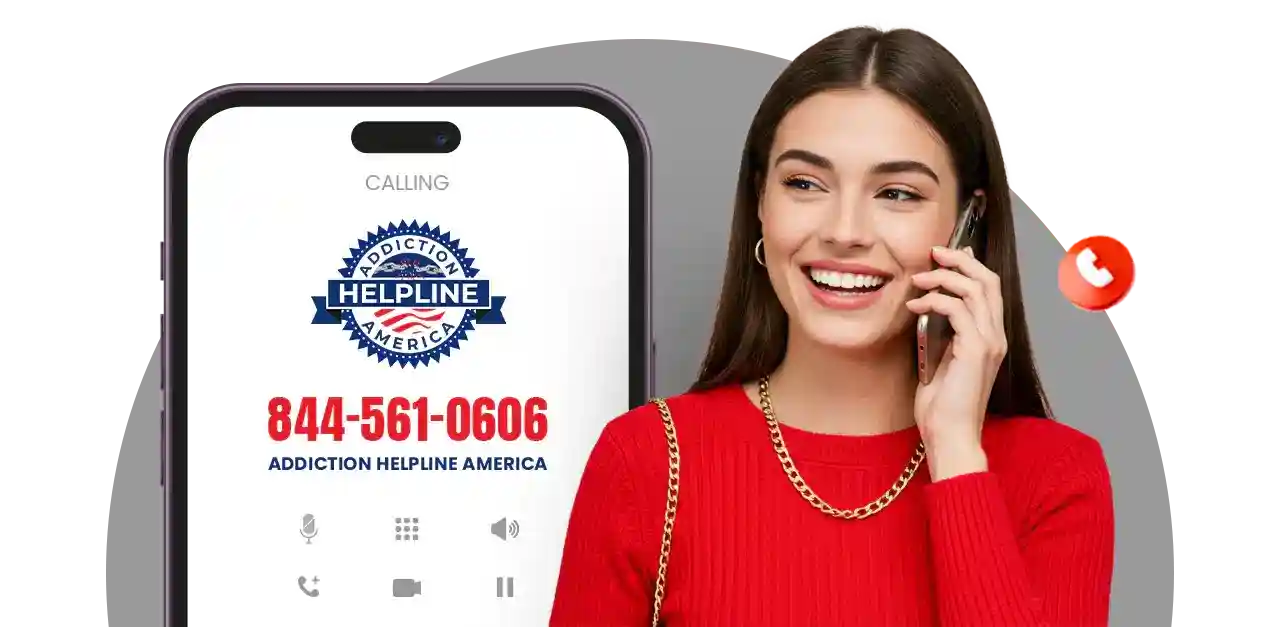
Why Finding the Right Addiction Help Resources Matters Now
Addiction help resources are available 24/7 across the United States and Canada to provide immediate support for anyone struggling with substance use or mental health issues. These resources include 24/7 crisis helplines, treatment locators to find nearby care, specialized support for various groups, harm reduction services like overdose prevention, and online support groups.
Addiction is a chronic disease that changes the brain. According to recent data, 48.5 million Americans aged 12 or older had a substance use disorder in 2023, and about half also experience serious mental illness, making integrated care essential.
The good news? Recovery is possible, and you don’t have to figure it out alone. Taking the first step can feel overwhelming, but comprehensive addiction help resources exist to guide you from crisis to recovery with confidential, compassionate support.
At Addiction Helpline America, we connect individuals and families with these vital resources across the nation. We offer 24/7 support, treatment referrals, and personalized guidance custom to each person’s unique recovery journey. Our team is here to help you steer the path forward.
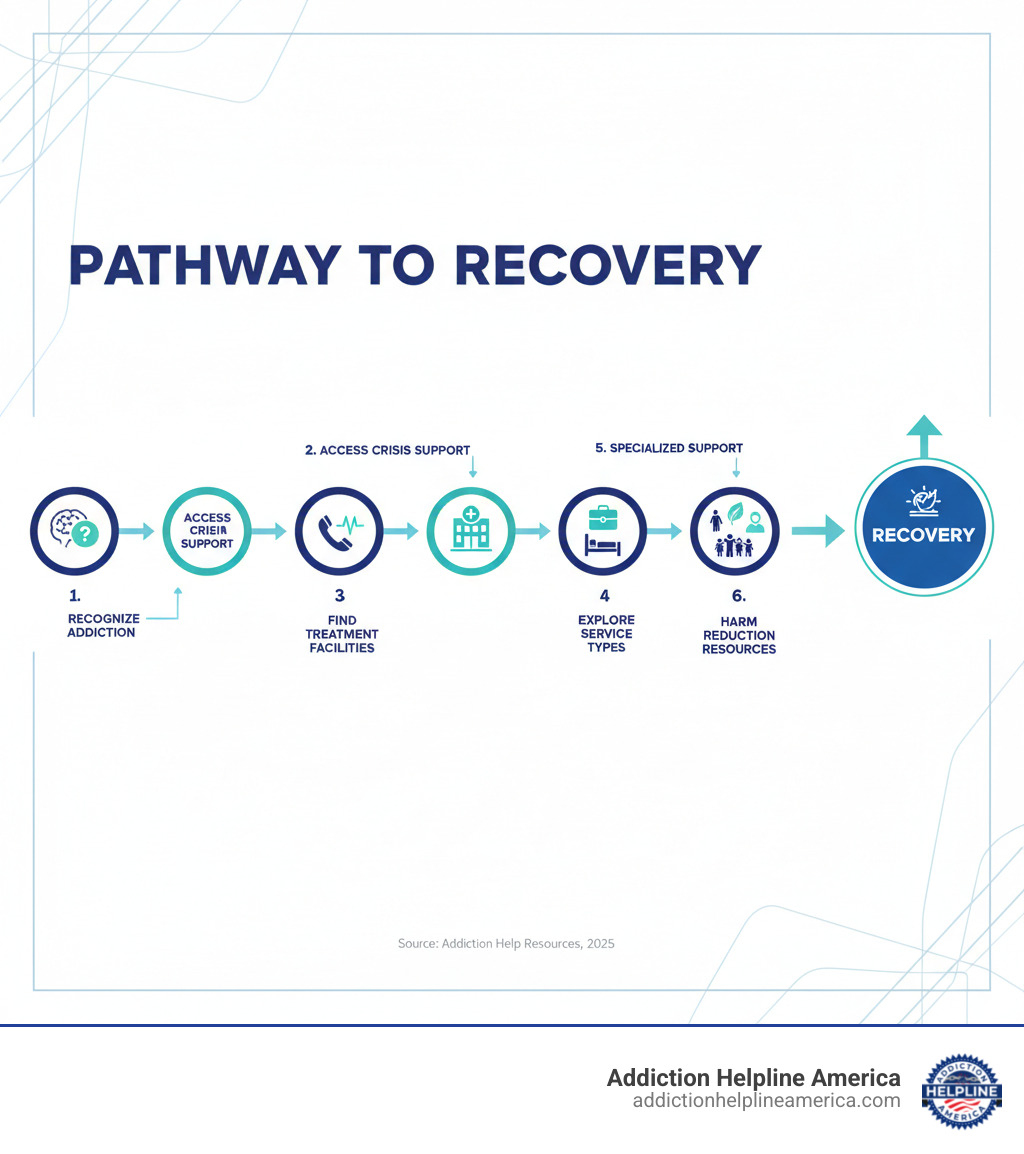
Glossary for addiction help resources:
- National Drug Abuse Hotline Numbers: Free Addiction Help 24/7
- best rehab programs
- counseling for addiction
1. Call a 24/7 Helpline for Immediate Crisis Support
When you’re in crisis, you need support right now, not during business hours. Whether you’re watching a loved one struggle, panicking over a recent findy, or feeling completely overwhelmed, 24/7 helplines are your safe first step.
These services connect you with trained, non-judgmental counselors who can help you figure out what to do next. Our own Addiction and Rehab Hotlines connect you with compassionate advisors any time, day or night. These conversations are free and completely confidential.
It’s important to know when to call a helpline versus 911. If someone is unconscious, having trouble breathing, or in immediate physical danger, call 911 first. For everything else—when you need guidance, treatment referrals, or emotional support—a helpline is the right choice.
Call Now – Your Journey to Recovery Begins Today!

Take the first step towards a healthier life! Call now to connect with our compassionate team and start your recovery journey today. Your path to healing awaits!
Our recovery specialists are available 24/7 to provide support, and all calls are confidential and free. Reach out anytime – we’re here to help!
How Helplines Provide Immediate Assistance
Helplines are always available and remove common barriers to getting help. They are free, so you won’t receive a bill, and your conversation is confidential, creating a safe space to speak honestly. While they don’t offer ongoing therapy, they excel at connecting you with the addiction help resources you need, such as treatment facilities or local support groups. Many national helplines also offer services in multiple languages, including Spanish.
Key national resources include:
- The 988 Suicide & Crisis Lifeline: Call or text 988 for 24/7 support. Veterans can press 1, Spanish speakers can press 2, and LGBTQ+ individuals can press 3.
- SAMHSA’s National Helpline (1-800-662-HELP): A 24/7 treatment referral service in English and Spanish.
- The Disaster Distress Helpline (1-800-985-5990): For crisis counseling related to disasters.
- The LGBTQ+ National Hotline (1-888-843-4564): Staffed by trained LGBTQIA+ volunteers.
What Constitutes a Crisis?
If you feel you need immediate support, that’s reason enough to call. You don’t need to meet an official definition of a crisis to deserve help. However, certain situations always warrant an immediate call:
- Overdose: If you suspect an overdose, call 911 immediately.
- Suicidal Thoughts: The 988 Lifeline is specifically designed for suicide prevention and intervention.
- Severe Withdrawal: Symptoms from alcohol or benzodiazepines can be life-threatening. Helplines can connect you to medical detox facilities for safe withdrawal.
- Mental Health Emergency: An intense panic attack, a psychotic episode, or severe emotional distress are all reasons to seek immediate support.
- Feeling Overwhelmed and Unsafe: If you’re terrified of relapse, have found your teenager is using drugs, or simply can’t carry the weight anymore, reaching out is a sign of strength.
For any medical emergency, call 911 first. For all other crises related to addiction or mental health, a helpline provides the immediate, compassionate connection you need.
2. Use a Treatment Locator to Find a Facility Near You
Once you’re ready to take the next step, the question becomes: Where do I go for treatment? Treatment locators are essential addiction help resources that act as specialized search engines for recovery, helping you find a facility that matches your location, needs, and circumstances.

Finding the Right Addiction Help Resources for You
Finding the right program is about more than just proximity; it’s about matching your unique needs. At Addiction Helpline America, our free and confidential Treatment services specialize in this. Our advisors learn about your situation—including substance use, mental health concerns, and insurance—and connect you with facilities from our network across all 50 states and D.C.
Another key resource is SAMHSA’s FindTreatment.gov, the federal government’s comprehensive, anonymous treatment locator. It allows you to filter your search with specific criteria:
- Types of Care: Find help for substance use, mental health, or both. We can help you find Rehab Centers for Co-Occurring Disorders that treat these issues simultaneously for better outcomes.
- Service Setting: Choose between Inpatient Rehab Programs: Complete Guide for 24/7 support or outpatient programs that offer flexibility.
- Payment Options: Filter by Medicare, Medicaid, private insurance, or facilities with sliding fee scales.
- Special Programs: Locate services for specific groups like veterans, young adults, or the LGBTQ+ community.
Federally Qualified Health Centers (FQHCs) and Certified Community Behavioral Health Clinics (CCBHCs) are also excellent options, as they provide comprehensive care to underserved communities regardless of one’s ability to pay.
Before visiting any facility, call first to confirm they offer the services you need, understand their admission process, and ask about their therapeutic approach. This simple step ensures the program is a good fit for you.
Key Differences in Resources: US vs. Canada
While researching addiction help resources, you’ll notice differences between the US and Canada. Canada’s services are primarily delivered through provincial health systems. The US system is a mix of federal, state, and private facilities, creating a diverse but complex landscape.
At Addiction Helpline America, our expertise is focused on navigating the extensive resources available throughout the United States. We help you sort through the options to find comprehensive care that fits your specific situation, no matter which state you call home.
3. Explore Different Types of Addiction Treatment Services
Addiction is a complex disease, and recovery is not a one-size-fits-all journey. A wide spectrum of addiction help resources and treatment services exist to meet you at any stage of recovery. The Principles of Drug Addiction Treatment emphasize that care should be readily available and custom to an individual’s changing needs.
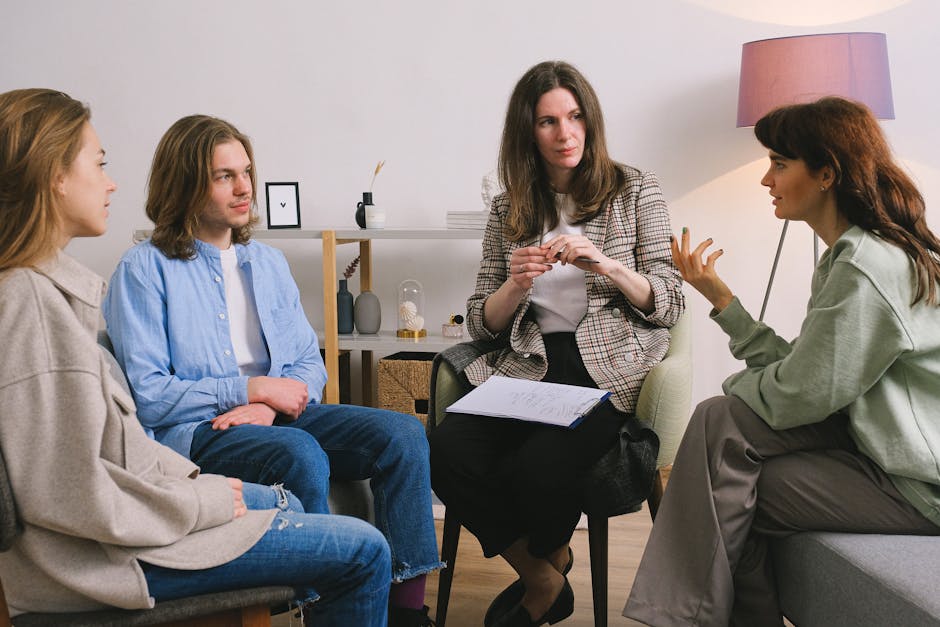
From Withdrawal Management to Long-Term Recovery
Recovery often involves several stages of support:
- Withdrawal Management (Detox): This is often the first step, providing a safe, medically supervised environment to manage withdrawal symptoms. You can learn more about our Alcohol Detox Program and the general Detoxification Process.
- Residential/Inpatient Programs: These offer 24/7 care in a structured environment, ideal for those needing intensive support to achieve sobriety. Our Inpatient Rehab Programs: Complete Guide provides more detail.
- Outpatient Counseling: These programs allow you to live at home while attending regular therapy sessions, offering flexibility for work and family life. We can help you find local options like Addiction Counseling New Orleans.
- Medication-Assisted Treatment (MAT): MAT combines medications with therapy to treat opioid and alcohol use disorders by reducing cravings and withdrawal. You can find Buprenorphine Practitioners and Opioid Treatment Programs through specialized locators.
- Aftercare and Continuing Support: Long-term recovery is supported by sober living arrangements, peer support groups (like AA or NA), and ongoing therapy.
Understanding Costs and Payment Options
Don’t let cost be a barrier to seeking help. The Affordable Care Act requires most insurance plans to cover substance use disorder services. Many facilities also offer services on a sliding fee scale based on income, and government-funded programs provide care at little to no cost. Our team at Addiction Helpline America can help you steer insurance verification.
When contacting facilities, always ask about included services, accepted insurance plans, and payment assistance options to understand the full cost.
Resources for Specific Substance Issues
Different substances require specialized treatment approaches. We offer comprehensive information to help you find the right addiction help resources for your situation:
- Alcohol: The National Institute on Alcohol Abuse and Alcoholism offers an NIAA Alcohol Treatment Navigator, and our guide to Alcoholism provides further insight.
- Opioids: In addition to MAT, our Opiate Addiction Treatment page details available options.
- Gambling and Tobacco: Behavioral addictions like gambling and tobacco use also have specialized support programs, including cognitive-behavioral therapy and state-level quitlines.
4. Access Specialized Support for Specific Needs
Effective recovery recognizes that everyone’s journey is unique. The best addiction help resources are custom to an individual’s age, cultural background, and personal experiences. Specialized support exists to meet people exactly where they are.
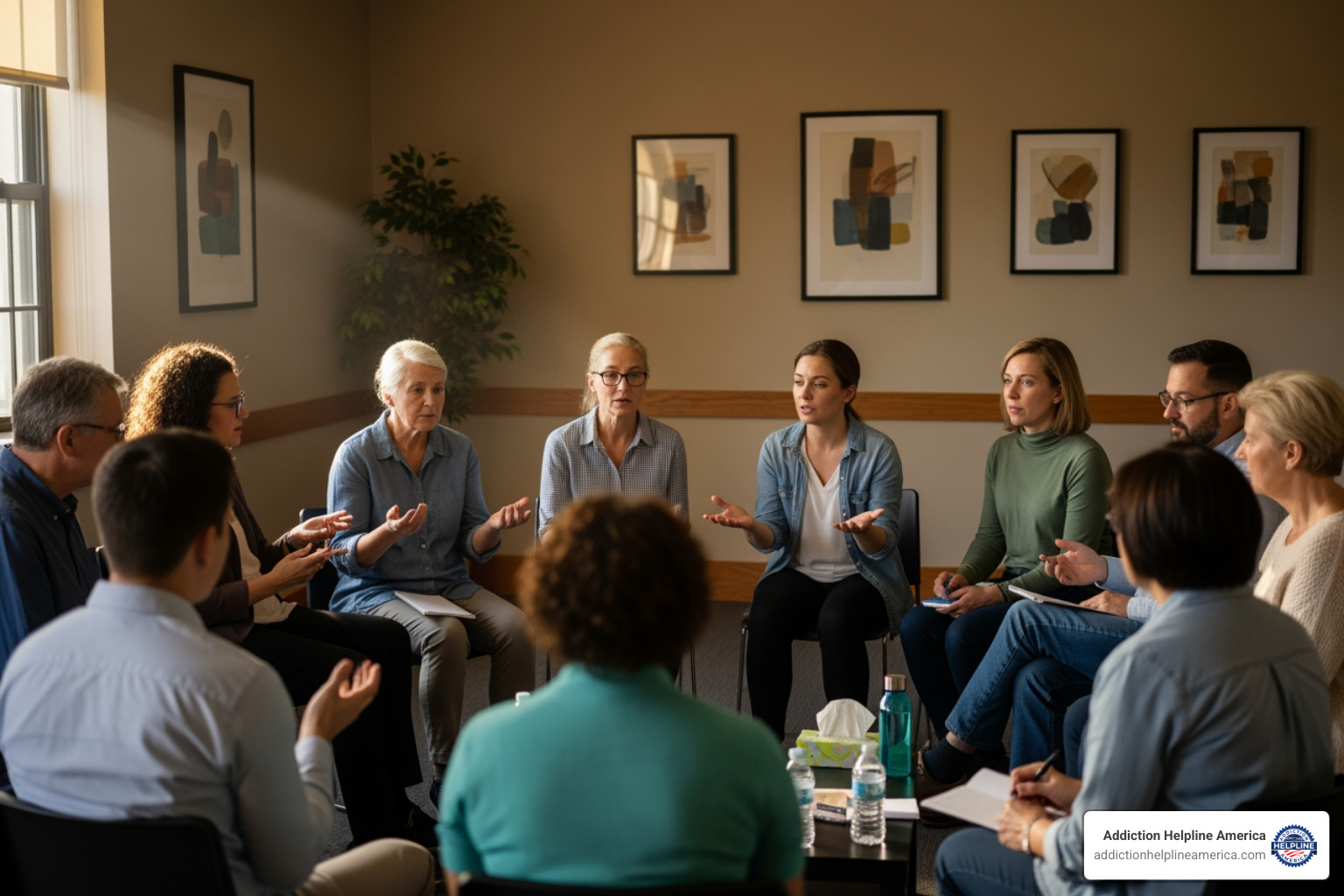
Support for Youth and Children
Young people face unique challenges like peer pressure and developmental changes, requiring programs designed specifically for them. Resources like The National Institute on Drug Abuse – Teens (teens.drugabuse.gov) offer age-appropriate information. School-based programs and online resources also provide accessible, judgment-free support for adolescents.
Call Now – Your Journey to Recovery Begins Today!

Take the first step towards a healthier life! Call now to connect with our compassionate team and start your recovery journey today. Your path to healing awaits!
Our recovery specialists are available 24/7 to provide support, and all calls are confidential and free. Reach out anytime – we’re here to help!
Help for Family Members and Caregivers
Addiction impacts the entire family, causing financial strain, broken trust, and emotional exhaustion. It’s crucial for family members to seek their own support. Our article on Life With An Addict explores these challenges.
Taking care of yourself is essential. Addiction help resources for families include:
- Support Groups: Al-Anon and Alateen provide peer support for families and friends affected by a loved one’s alcohol use.
- NAMI: The National Alliance on Mental Illness offers extensive resources and peer-led services for families.
- Setting Boundaries: Learning to establish healthy boundaries is a critical skill for protecting your own well-being.
If you are considering a structured conversation, our guide on Holding An Intervention can help.
Culturally Specific Resources for Indigenous Peoples
For Indigenous peoples, healing from addiction is often connected to addressing historical trauma and cultural disconnection. Mainstream resources may not be adequate. The most effective programs integrate Indigenous cultures, traditions, and ceremonies, viewing wellness through a holistic lens that includes mental, physical, spiritual, and emotional health.
In the United States, SAMHSA’s Tribal Training and Technical Assistance supports the development of culturally competent services. Community-based programs within Indigenous communities often provide the most appropriate care, creating a safe space for healing that is grounded in cultural identity. At Addiction Helpline America, we are committed to connecting individuals with treatment options that honor their cultural background.
5. Use Harm Reduction and Online Addiction Help Resources
Recovery isn’t always a straight line. Harm reduction strategies and online addiction help resources meet people where they are, focusing on reducing risks and saving lives rather than demanding immediate abstinence. Any step toward safety is a step in the right direction.
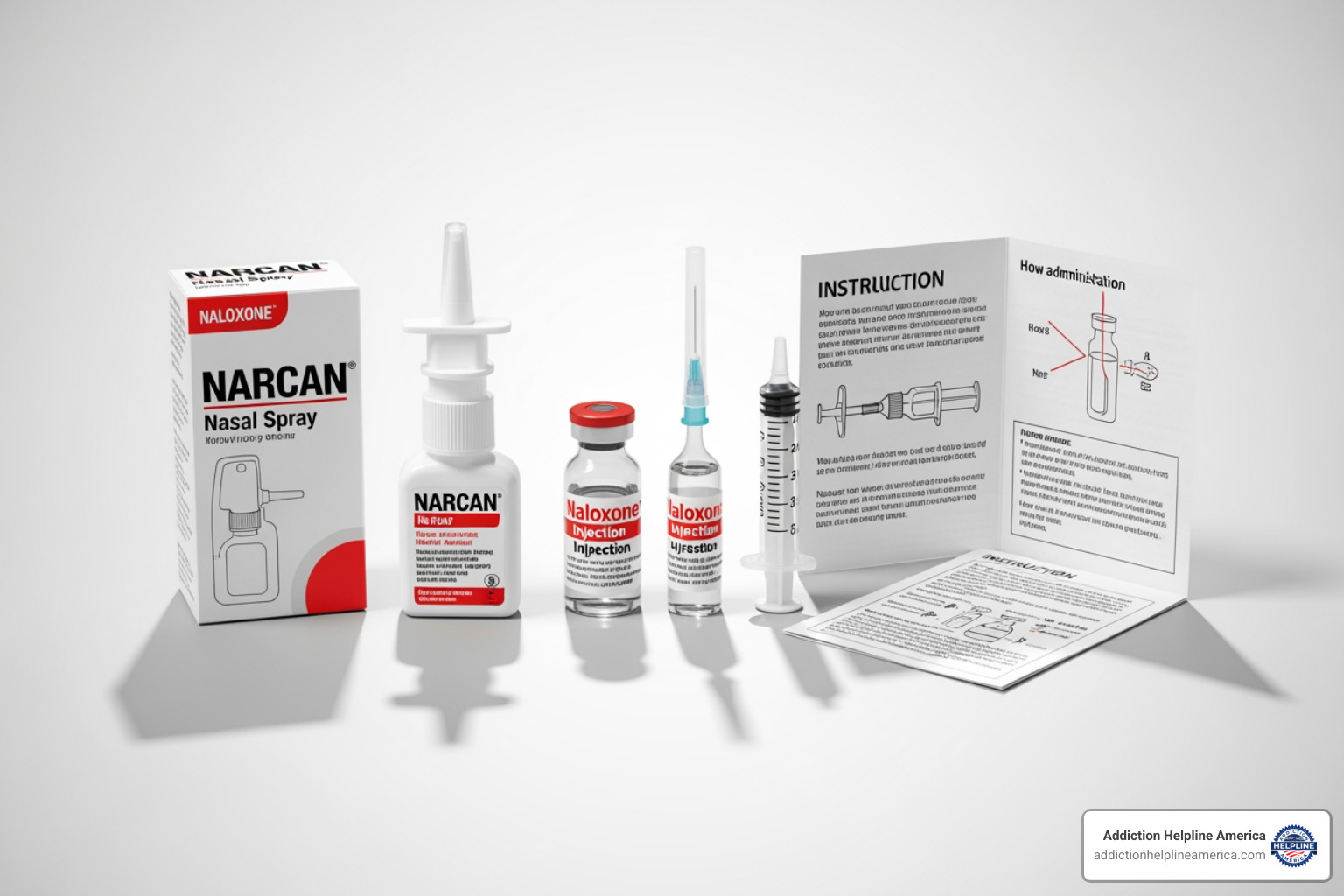
Harm Reduction and Overdose Prevention
The opioid crisis has made overdose prevention more urgent than ever. These services are saving lives daily:
- Naloxone Access: This medication can reverse an opioid overdose and is available without a prescription in most states. The CDC’s Life Saving Naloxone resources provide information on where to get it and how to use it.
- Overdose Response: The CDC’s “Stop Overdose” initiative at cdc.gov/stopoverdose offers guidance on recognizing and responding to an overdose.
- Supervised Consumption Sites and Drug Checking: Though less common in the US, these services are proven to prevent overdose deaths and connect people to care.
Online Self-Help and Peer Support Communities
The internet provides immediate, anonymous support from anywhere. Virtual recovery communities, mobile sobriety apps, and online meetings offer lifelines for those who can’t or prefer not to attend in-person groups.
Traditional peer support groups have accepted the digital age and now offer robust online options:
- Alcoholics Anonymous (AA): Find free virtual and in-person meetings at Find A.A. near you.
- Narcotics Anonymous (NA): Offers similar support for drug use. You can Find a meeting online.
- SMART Recovery: Provides a science-based approach with free online and in-person peer support groups.
These online resources complement professional treatment by providing ongoing engagement and reinforcing healthy coping strategies.
Call Now – Your Journey to Recovery Begins Today!

Take the first step towards a healthier life! Call now to connect with our compassionate team and start your recovery journey today. Your path to healing awaits!
Our recovery specialists are available 24/7 to provide support, and all calls are confidential and free. Reach out anytime – we’re here to help!
Conclusion
From 24/7 crisis helplines and treatment locators to specialized programs and online communities, a vast network of addiction help resources is ready to support you. The journey to recovery can feel daunting, but you’ve already taken a crucial step by seeking information.
Here’s the truth: addiction is a treatable disease, and recovery is possible. The hardest part is often deciding that things can be different. You don’t have to figure it all out alone.
At Addiction Helpline America, our mission is to connect people to hope. We offer free, confidential, and personalized guidance to help you find the right recovery program from our extensive network across all fifty states. Our team takes the time to understand your unique situation and connect you with a clear path forward.
The resources in this guide are all pieces of the recovery puzzle. Your journey might use one or several of them. There is no single “right way” to get better—only the way that works for you.
What happens now is up to you. You can call a helpline, explore a treatment locator, or reach out to us for personalized guidance. Any action, no matter how small, moves you closer to the life you deserve.
We’re here whenever you’re ready. For more information about finding personalized treatment, visit our services page.
Our helpline is 100%
free & confidential
If you or someone you care about is struggling with drug or alcohol addiction, we can help you explore your recovery options. Don’t face this challenge alone—seek support from us.
Programs
Resources
Will my insurance
cover addiction
treatment?
We're ready to help
Find the best
drug or alcohol treatment
center
Are you or a loved one struggling with addiction? Call today to speak to a treatment expert.















